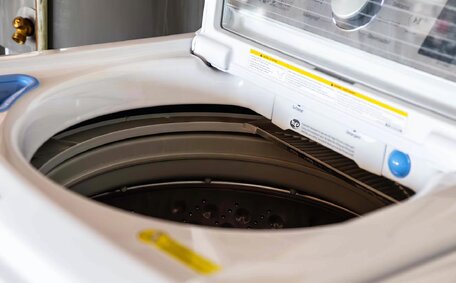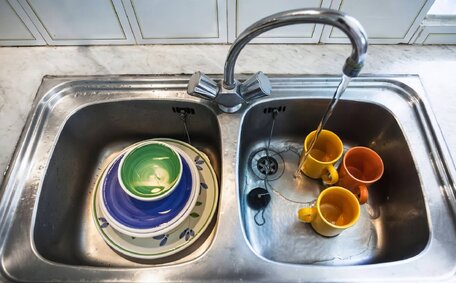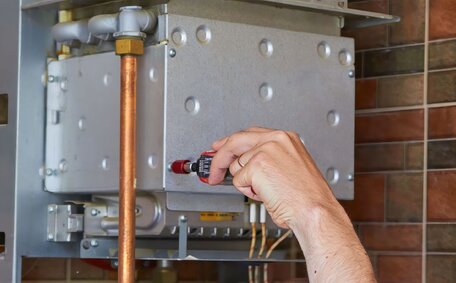Introduction to Hot Water Systems
An efficient heat pump hot water system means comfort in your Sydney home. Hot water from the best hot water system allows us to enjoy warm showers, do laundry, wash dishes, and carry out many other daily activities that require heated water.
Consider the dependable storage water heater systems that not only heat but also store water for immediate use.
Water tank systems can be powered by electricity, gas, or a hybrid of both, offering flexibility for various energy infrastructures. Instantaneous gas electric water heaters ensure you have immediate access to hot water.
The right hot water system your home depends on is dictated by your household’s hot water usage, available energy sources like electricity, gas or solar power, and involves more considerations than just the electricity gas balance of your abode. By appropriately sizing your gas hot water system, you can minimise energy costs and optimise heating efficiency for your needs.
We’ll examine a range of electric and gas water heaters suited for both central coast and urban households, consider the various types of water heaters available, and identify important factors in choosing the ideal system for your home.
Determining Your Household’s Hot Water Usage
Selecting a home water system requires a precise assessment of your household’s water use. This ensures the chosen system meets your hot water needs and operates efficiently.
Begin by considering these crucial factors to select the ideal hot water solution:
- Number of residents - Smaller households may need a less-capacity system, while larger ones typically require greater hot water capacity and a bigger water tank.
- Peak usage times - Understanding peak household water usage helps in selecting the suitable system size and model.
- Fixtures - Consider the number of baths/showers, sinks, washing machines etc needing your water to be hot and how many run simultaneously.
Typical guidelines for per-person hot water usage are as follows:
- Shower - 10-20 litres
- Bath - 50+ litres
- Sink use - 5 litres
- Dishwasher cycle - 15-30 litres
- Washing machine cycle - up to 150 litres
Understand your household’s unique requirements using these factors when weighing up hot water system types for your home.
Comparing Storage Tank and Tankless Systems
When choosing a type hot water system for your dwelling, two of the main options to consider are storage tanks and tankless systems. Understanding how each type water heater, including solar options, operates and their key differences helps determine what will suit your home best.
Here is a summary of the functionality, benefits, and drawbacks of storage and tankless systems:
- Storage Tanks
- Store and heat water in an insulated tank ready for use
- Storage tanks generally offer more budget-friendly upfront costs
- Provide a reservoir of hot water for peak demand
- Can lose some heat over time in storage water
- They require extra space for the tank
- Tankless Systems
- Tankless systems heat water on demand, activating only when needed
- Compact, no bulky storage tank
- Unlimited hot water on demand
- Higher upfront system cost
- May experience flow limitations during simultaneous, heavy usage
Other aspects like energy source—gas, electric, or solar—impact system efficiency and operational expenses.
Seek professional advice to ascertain which water heating system aligns best with your living situation and particular needs.
Choosing Between Gas, Electric, Solar and Heat Pump
The choice of a hot water system greatly hinges on key power sources such as gas, electricity, solar, or heat pumps. Comprehending these differences is key to choosing a hot water system that is suitable, efficient, and eco-friendly for your home.
Gas Systems
A gas water heater efficiently heats cold water by igniting natural gas or LPG, delivering a steady stream of warm water. Gas continuous flow water heaters offer a constant supply of hot water, ensuring unlimited access as needed. Gas storage tanks store heated water until needed.
- Lower operating costs than electric
- Gas continuous flow models are compact
- Gas storage tanks can lose heat over time
- Produce carbon emissions
Electric Systems
Electric hot water system technology utilises electricity to power elements that elevate water temperature. This includes storage and continuous flow.
- Electric systems generate no direct emissions but rely on grid-supplied electricity
- Lower upfront cost for electric storage
- Can have high operating costs depending on tariff rates
Solar Hot Water
Solar water systems harness the sun’s renewable energy to efficiently warm your water. Solar heat pump hot systems with panels align with gas or electric boosters for prime warming capabilities.
- Reduce environmental impact and energy bills
- Solar water heaters need roof space for panel installation
- Higher upfront cost
- Performance relies on sufficient sunlight
Heat Pump Systems
Heat pump water heaters are highly efficient as they expertly harness ambient air warmth to heat water effectively. They utilise a refrigeration cycle like a fridge or air conditioner.
- Extracting more energy from the air, they rank among the most efficient hot water systems
- Higher upfront cost
- Can operate in cloudy conditions
Review specifics of your required home water system, considering water needs, usage, space limitations, budget, and environmental goals, to select the best option.
Considering Energy Efficiency Ratings
A critical aspect to consider when choosing a hot water system is its energy efficiency rating. This rating indicates how effectively and efficiently a system converts its energy source into heat for water.
In Australia, hot water systems are required to display an energy efficiency label with a star rating between 1 and 10. One star is the least efficient and 10 stars is the highest efficiency.
Systems with high energy-efficiency ratings can significantly reduce energy consumption and costs over time, especially when compared to less efficient models. For example:
- A 5 star gas storage system uses around 30% less energy than a low 1 star system.
- Storage hot water system options like electric heat pumps can tout up to 7-star ratings and can be over 3 times more efficient than conventional electric storage tanks.
- Instantaneous gas systems rate around 6 stars due to their on-demand heating and lack of standby losses from storage.
Electric heat pump water heaters and solar systems usually boast the highest efficiencies and minimal environmental impacts. Gas instantaneous systems can also rate well for energy efficiency.
Take into account the efficiency ratings, expected heating costs, and your household’s usage patterns when comparing different system choices. Choosing an energy-efficient water heating system can lead to cost savings over time and has a positive environmental impact.
Installation and Maintenance Cost Comparisons
Evaluating home hot water systems necessitates considering initial installation costs and ongoing maintenance expenses.
Tank system choices, such as those with a water storage compartment, typically have lower initial costs than instantaneous systems. However, Continuous flow units often avoid the costly repairs or replacements that storage tanks may necessitate over their lifespan. Solar systems, although initially pricier due to setup costs, are energy savers, boasting heightened efficiency and fiscal savings later on.
Achieve the right balance by evaluating your household’s hot water demands and comparing the lifecycle costs of different systems. Consider available rebates and incentives as they can reduce initial system expenses.
Consider the system’s price, anticipated energy bills, and potential maintenance costs for a comprehensive comparison. This gives a true comparison.
Discuss options with a professional, who can do a great job making you very happy by finding the optimal system delivering performance and efficiency at a reasonable lifecycle cost. Selecting the optimal hot water strategy for your dwelling can secure financial savings in the long term.
Available Rebates and Incentive Programs
You may find that installing a new hot water system in your home could make you eligible for rebates and incentives, mitigating the upfront expense.
NSW’s Smart Energy Upgrade Programme provides discounts for energy-efficient electric heat pump and solar hot water systems. Rebates up to $1000 are available for households meeting eligibility criteria.
The Australian government’s STC incentive scheme applies to solar hot water system installations. Each system has a set number of Small-scale Technology Certificates which provide monetary savings off the total price depending on current STC rates.
Discuss potential rebates and how to get the best price with our plumbing services or your chosen plumbing professional when considering a new system. Factoring available incentives into the decision-making process allows you to invest in the optimal long-term solution while offsetting the initial purchase price.
Consulting the Experts on the Best System
With numerous types hot water systems available and complex factors to consider, it can be challenging to determine which one is truly optimal for your home needs.
Professional services are crucial in helping you choose a hot water heater that is both appropriate and efficient for your unique requirements.
Our team of hot water experts, consisting of highly skilled licensed plumbers, is dedicated to assisting Sydney homeowners, leveraging their vast experience and expertise. We invest time to grasp your family’s specific hot water habits, site constraints, budget and goals. After assessing your specific requirements, we offer bespoke advice on the perfect system type, considering you might have more needs than one could anticipate, features, capacity and energy source.
We are well-versed in the latest technologies across storage, instantaneous, solar, and heat pump water heaters. Our team was very diligent in staying updated on rebates, ensures installations meet regulations, and provides reliable maintenance and repairs as needed.
For custom advice on a new system for your home, email us, call 1300 349 338 or book a consultation. Our local hot water experts simplify the selection process.






